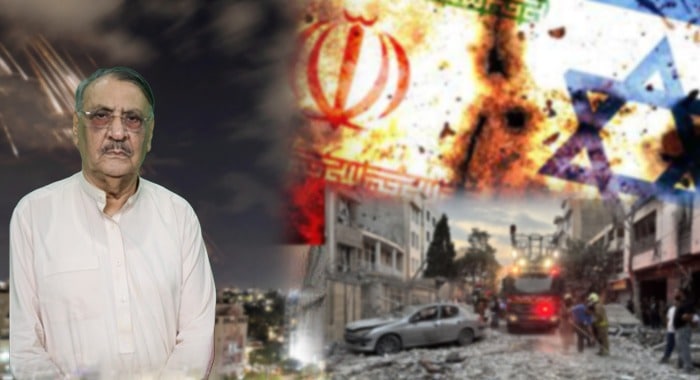Brig (R) Mehmood Shah
In the complex geopolitical landscape of South Asia and the Middle East, the strategic partnership between India and Israel poses a significant threat not only to Pakistan’s security but also to the broader regional stability. Despite Pakistan’s consistent message of peace and its policy of defensive restraint, both India and Israel have historically collaborated to sow unrest within Pakistan’s borders — often through covert operations and support for terrorist elements.
Recently, during heightened tensions between India and Pakistan, the Israeli Ambassador to India issued a controversial statement defending India’s so-called “Operation Sand Dune,” portraying it as a legitimate act of self-defense. However, such rhetoric only reaffirms the deepening military and intelligence cooperation between the two countries, which has long extended beyond conventional defense collaboration. Credible reports suggest that Israeli intelligence operatives, alongside their Indian counterparts, have maintained a covert presence in Srinagar and elsewhere, actively fueling anti-Pakistan activities.
This alliance is not new. Historically, Israeli pilots and warplanes have operated from Indian airbases, and intelligence sharing has reportedly played a key role in surveillance and target acquisition aimed at undermining Pakistan’s defense infrastructure. Pakistani forces, however, have consistently demonstrated readiness and resilience. In various incidents, timely intelligence and robust defense measures thwarted potential escalations, forcing adversaries into retreat.
The Iranian experience with Israel offers instructive parallels. Iran has faced sustained Israeli aggression, especially through the operations of Mossad, which has allegedly been involved in targeted assassinations of Iranian nuclear scientists and senior commanders within Iranian territory. Many of these operatives reportedly operated with the assistance or employment of Indian nationals, exposing a dangerous trilateral convergence of interests against regional adversaries.
One must ask: if Israel is Iran’s arch-enemy and India is closely aligned with Israel, why would Iran consider India a friend? The contradiction is strategic and ideological. The collusion between Indian and Israeli agencies poses a serious threat, not just to Iran but also to all regional states striving for autonomy and stability. Pakistan, in particular, must remain cautious of Indian soil being used as a launching pad for Israeli-led operations or proxy warfare.
While Iran continues to engage in proxy conflicts across the region from Lebanon to Syria its defensive infrastructure has revealed vulnerabilities. Israel’s precision strikes, reportedly enabled by sophisticated human intelligence networks inside Iran, have exposed critical weaknesses in Tehran’s internal security. Israeli agents, it is said, were informed down to the detail of which room certain targets slept in a damning indictment of Iran’s security lapse.
Despite this, Iran’s confrontation with Israel is far from over. Yet without overhauling its defense doctrine, enhancing internal counterintelligence, and adapting to modern hybrid warfare strategies, Iran risks further strategic setbacks. This war is not only military it is also psychological, informational, and asymmetric.
Pakistan, meanwhile, has prudently avoided entanglement in Middle Eastern conflicts, especially the Saudi-Iran rivalry. Despite occasional diplomatic overtures from Gulf states, Islamabad has maintained a policy of neutrality, urging regional players to resolve disputes through dialogue. Pakistan’s military doctrine remains centered on national defense not force projection across borders. Unlike global powers with overseas bases and aircraft carriers, Pakistan’s armed forces are structured to protect its territorial integrity, not to engage in expeditionary warfare.
Yet, the India-Israel nexus continues to test Pakistan’s patience and preparedness. Both countries known globally for their oppressive tactics in Kashmir and Palestine — have found common cause in undermining Pakistan. Their actions are not just a threat to Pakistan, but to regional peace. While they seek to project power through alliances, Pakistan relies on its professional armed forces, strategic foresight, and the resilience of its people.
In previous standoffs, Pakistan’s decisive military response and firm diplomatic posture have not only foiled aggression but earned international recognition. India, once again forced to back down, has resorted to seeking American mediation a clear indicator of the limits of its military and strategic ambitions.
Israel and India’s ambitions in the region do not stop at containment. There are growing concerns that their long-term designs include asserting influence over the Middle East through alliances with Gulf monarchies, and potentially isolating countries like Iran and, eventually, Pakistan. But geography and capability matter. Israel cannot directly strike Pakistan due to logistical limitations, and any effort to use India as a proxy would only escalate conflict in an already volatile region.
Pakistan must remain vigilant but measured. While our forces stand ready to counter any aggression, we must also continue our policy of strategic restraint and regional peace-building. Iran, despite its entanglement in proxy wars, deserves regional solidarity against foreign subversion. At the same time, Islamabad must continue strengthening its defenses, modernizing its security architecture, and reinforcing its position as a responsible nuclear state.
In conclusion, the India-Israel partnership is not just a bilateral alliance it is part of a broader attempt to reshape regional power dynamics. But history has shown that Pakistan cannot be intimidated. Its resolve, military capability, and unity remain its greatest strength. As for Iran, one can only hope its leadership takes lessons from its vulnerabilities and adapts accordingly. The path to regional peace lies not in covert aggression, but in cooperative security and mutual respect.





